
We were curious to see what the highest-trafficked websites use as their hosting platform, plugins, third-party apps, programming language, content management system (CMS), and more. To do this, we analyzed Alexa’s list of the top 500 websites, as they provide the most comprehensive listing of global internet traffic data. Looking under the hood of the web’s most popular sites gives us an idea of how websites are built in today’s technological climate and show us the technologies that are pulling ahead in the race to win the web.
The Prevalence of WordPress
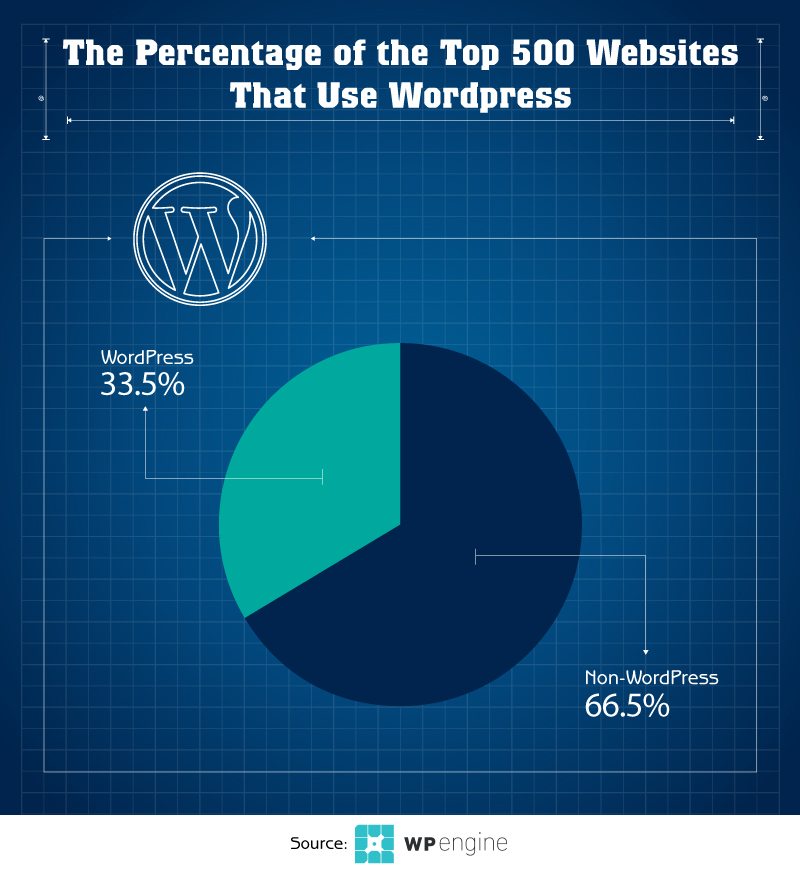
WordPress is a prominent force in web development today. Its engineering resources and developer community – not to mention ease of use – all contribute to its popularity. WordPress is specifically designed to be a base model car so developers and designers can customize every element of their website built atop of a sturdy foundation. The adaptability of WordPress also helps boost its popularity. Of the 500 most trafficked websites analyzed, over 33 percent are built on WordPress.
WordPress is the only single platform to have such a large presence in web development. Nearly 67 percent of the highest trafficked websites (324 sites) are built on different platforms.
Some websites are built entirely from scratch, while others are built from a variety of foundational web development platforms and systems, much like the many different brands of cars you might see on the road today.
Choosing to Use CMS
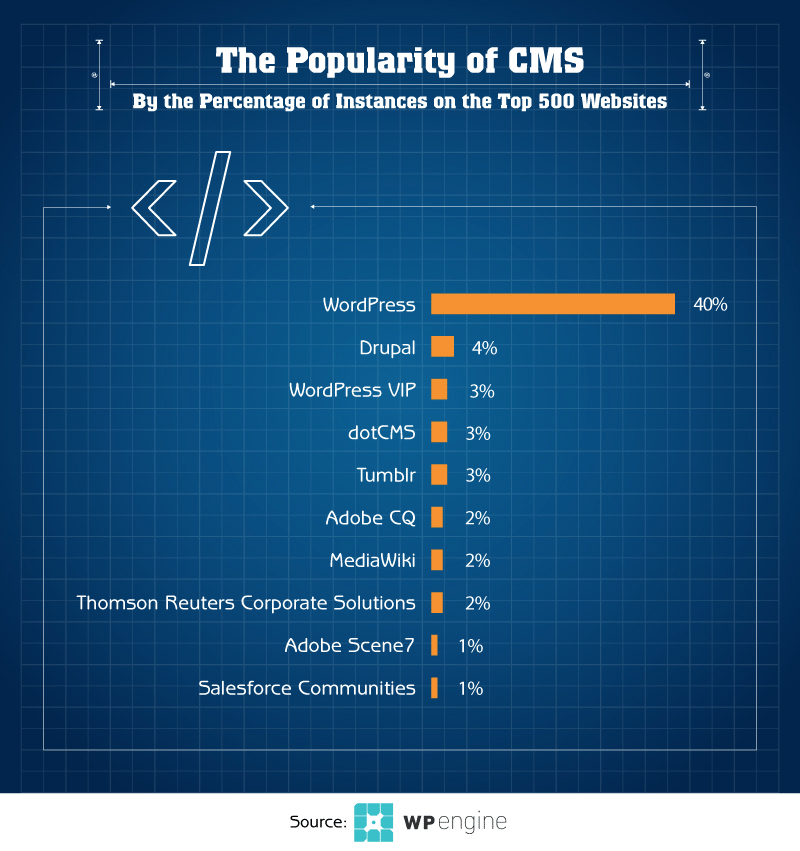
When it comes to content management systems (CMS) used to help create and manage digital content, WordPress leads the pack. Of Alexa’s top 500 websites, 40 percent use WordPress as their content management system. At its core, WordPress may have been built as a blogging tool, but with the modernization and limitless possibilities of plugins, WordPress’ application as a CMS has made it the most popular choice in the world. In our study, WordPress VIP is separate from WordPress.org and other WordPress installations.
No other CMS accounted for over 4 percent of the top 500 websites, according to Alexa. Drupal, an open-source CMS behind the U.S. Department of Energy’s website, is used by 4 percent of the websites examined, and the CMS WordPress VIP powers 3 percent.
Salesforce Communities and Adobe Scene7 account for the lowest amount of CMS utilization across the top 500 sites (2 percent combined).
The Popular Features on Top Sites
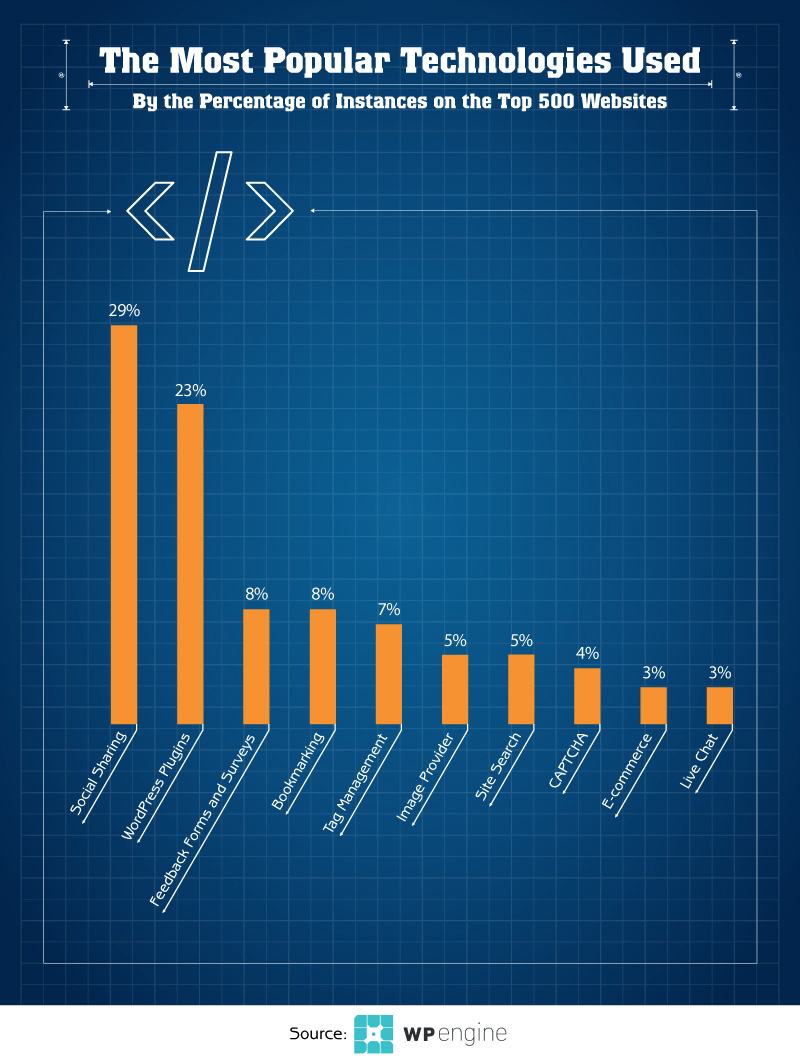
Social sharing can be worth big bucks to certain brands, and more than 1 in 4 sites on Alexa’s top 500 list feature the option for visitors to share their content on their favorite social networking platforms – like Facebook, Twitter, and Pinterest. Often simplified with recognizable buttons, sites have made it easy for their readers to share their information by incorporating a social aspect onto their webpage.
More than 1 in 5 websites also utilize WordPress plugins. With more than 50,000 plugins to date, sites have easy access to tools that allow them to use functionality like contact forms, search engine optimization, and even e-commerce.
Other technologies are markedly less popular. Fewer than 1 in 10 sites implement options like feedback forms, bookmarking, or live chat.
The Most Common JavaScript Libraries
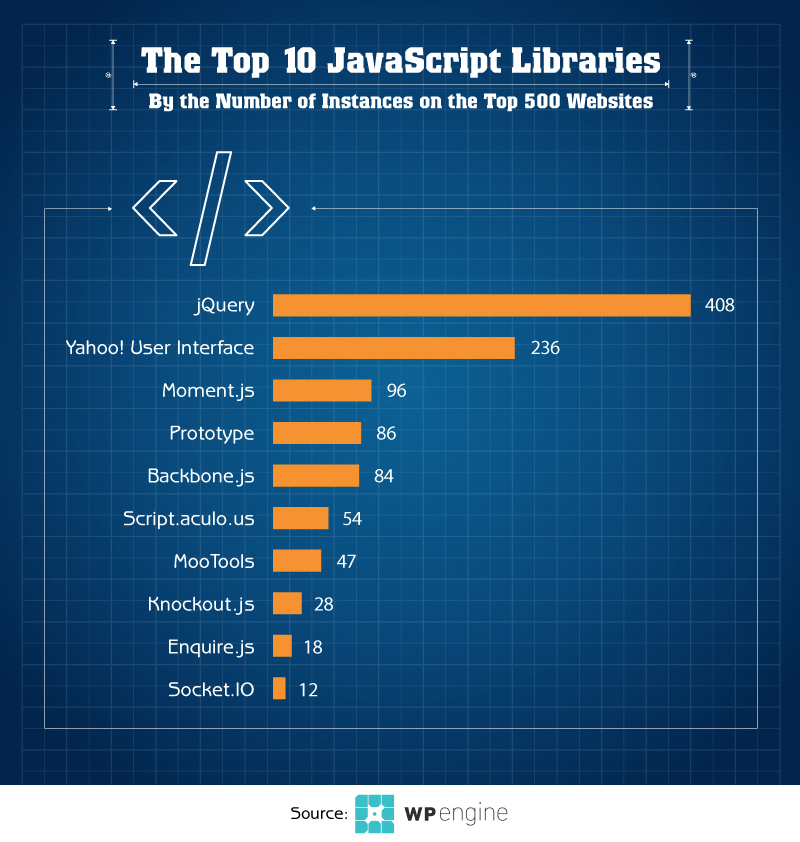
JavaScript libraries – which allow users to populate existing code for common internet functions without having to do all of the legwork themselves – help streamline the web creation process.
Of the 500 top sites, 408 of the JavaScript libraries used to compose these sites utilize jQuery. A cross-platform JavaScript library, jQuery is an open-source software that focuses on making HTML documents more manipulatable with ease.
While jQuery is currently the most popular JavaScript library in the world, the Yahoo! User Interface (which is no longer actively maintained) is utilized on 236 sites. Like jQuery, YUI is free for all users and used to construct websites like The Verge.
Javascript libraries like Prototype (86), Moment.js (96), and Backbone.js (84) are each used on almost 100 of the top 500 sites, according to Alexa.
Web-Hosting Solutions
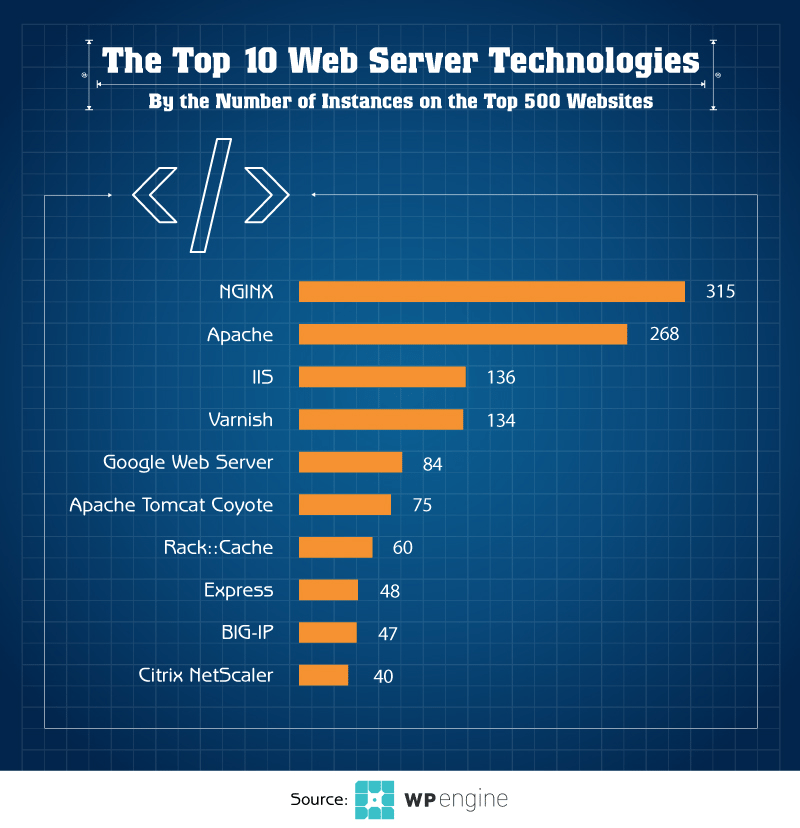
Apache is the world’s most popular web server software and allows a single computer to host multiple websites. Open source and free to use, Apache supports multiple operating system platforms like Linux, Windows, and Mac OS. Because Linux is often an open-source operating system solution, Linux and Apache is the most popular web hosting combination.Apache may be the most popular, but server solutions like NGINX and IIS are also common across the web. Like Apache, NGINX is open source and works as a reverse proxy, load balancer, and HTTP cache for other servers. IIS – or Internet Information Services – is an all-purpose web server built by Microsoft that utilizes Windows exclusively across the web.
Internet Add-Ons
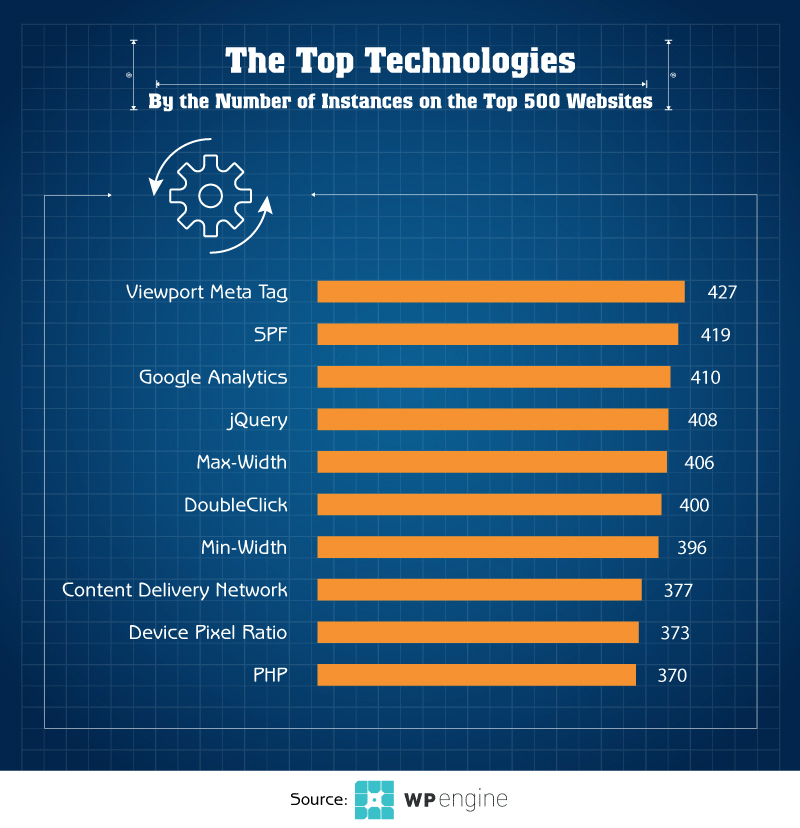
Google Analytics, which was first introduced in 2005, is currently the world’s most popular analytics installation. Google Analytics allows users to see the demographics of their visitors as well as key trends in site traffic and content engagement. Businesses and shopping sites tend to use Google Analytics more often than any other webpage.
Integration Necessities
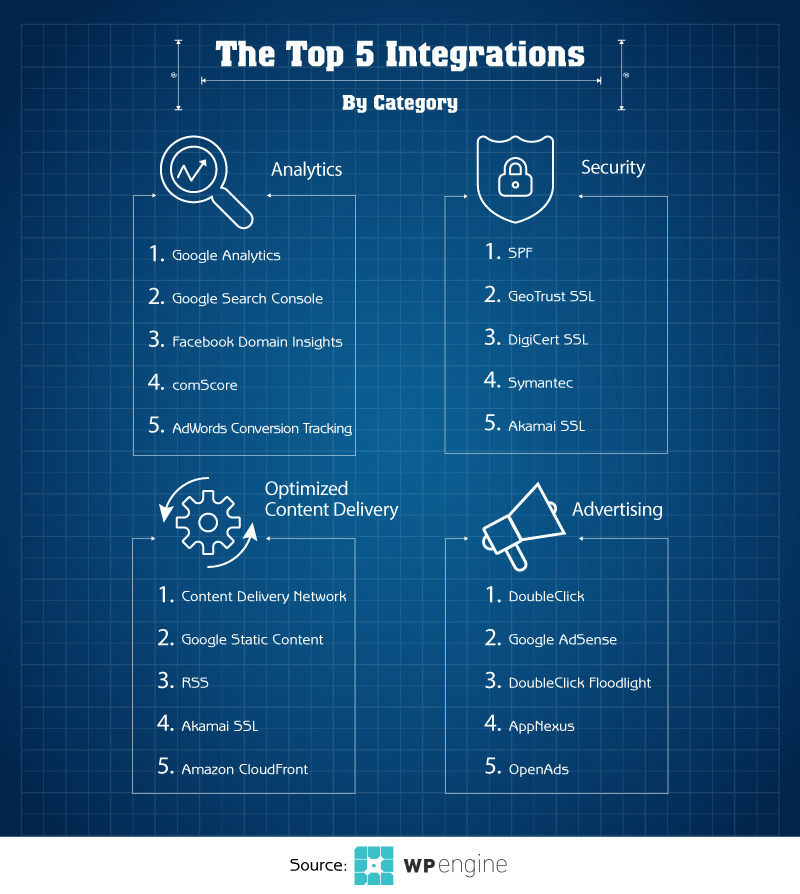
Of course, for every type of improvement or upgrade you want to make to your website, multiple options might meet your needs.
In each integration category, there are multiple integrations to choose from that help make the most popular websites the best on the web. Security integrations, like SPF and SSL apps, help keep information encrypted so malicious individuals can’t take advantage of the behind-the-scenes communication that happens between your computer and the websites you visit. Other plugins, like EverCache, help websites deal with high traffic during peak times. Let’s say your company’s branded content starts to go viral. EverCache makes sure all the requests are served rather than turned away – which is very important when trying to attract new customers.
One of the most interesting revelations comes out of the analytics category. Excepting Facebook Domain Insights and comScore, the top analytics apps used on the internet’s 500 most popular websites are all Google products. Google Analytics, Google Universal Analytics, and Google Analytics Classic are all merged on the above chart into Google Analytics. Other products offered by Google also help developers and website stakeholders analyze, manage, and respond to the performance of their sites. It becomes clear from this chart that Google dominates the analytics category, particularly when it comes to the most popular sites on the web.
Conclusion
Many of the web’s most popular websites are built on the same foundation. Third-party app integrations are a popular way to turn simple foundations into unique, high-performing websites – particularly because there are so many integrations that serve different purposes online.
It’s because of these issues that WP Engine created a PHP Compatibility Checker. Web developers can structure content based on foundational platforms like WordPress, or they can completely customize the way web content is displayed using these popular integrations. The possibilities are endless. Depending on your needs, WP Engine can help you serve content on a global scale, giving you publishing agility and the power to expand your brand to new heights.
SOURCES
- https://wpengine.com/blog/plugged-security-plugins/
- https://www.madetech.com/blog/javascript-fatigue
- https://github.com/aFarkas/html5shiv
- http://marketingland.com/as-google-analytics-turns-10-we-ask-how-many-websites-use-it-151892
- https://segment.com/blog/the-deep-roots-of-js-fatigue/
Methodology
We used Alexa to compile a list of the 500 highest trafficked websites on the internet and then used the BuiltWith API to analyze and categorize the data. The percentages and numbers shown are based on what BuiltWith could detect. For example, the data on the Top 10 Web Server Technologies infographic is limited because BuiltWith could only detect the web server tech for 93 percent of websites, and the remaining 7 percent is not shown.
Fair Use Statement
We grant permission to use the images found on this website for noncommercial purposes only. However, we also ask that if you do so, please attribute the creators by linking back to this web page so your readers can learn more about this project and its methodology.